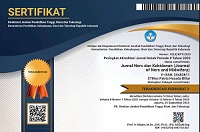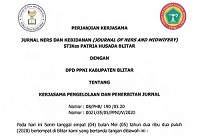Health Education by Nurses: Self-Care of Patients with Chemotherapy from a Specialized Cancer Institute in Lima-Peru
DOI:
https://doi.org/10.26699/jnk.v7i3.ART.p307-313Keywords:
Effectiveness, educational program, self-care, chemotherapyAbstract
Objective: To determine self-care in patients with chemotherapy in a pre-post educational intervention test performed by nurses from a specialized oncology institute. Methodology: Quantitative, quasi-experimental, longitudinal. Population of 90 patients with chemotherapy treatment, who were given 3 educational sessions with a pre and post test evaluation; in addition, a questionnaire with 4 dimensions was applied: nutrition, hygiene, infection prevention and avoidance of complications, with 20 items, a Likert scale validated by experts and a reliability of 0.8. Results: In the pre-test, self-care levels were 60% low, 22.2% high and 17.8% medium. In the post-test, self-care levels were 96.7% high and 3.3% medium. In relation to the dimensions of self-care in the pre-test, levels were found to be in Food: 52.2% low and 26.7% high; Hygiene: 42.2% low and 17.8% high; Infection prevention: 36% high and 30% low; and avoidance of complications: 55.6% low and 8.9% high. Finally, in the post-test, levels of: Feeding 94.4% high and 5.6% medium; Prevention of infections: 91.1% high and 8.9% medium. Dimensions: Hygiene and avoidance of complications, obtained 100% high level. Conclusion: It was demonstrated that nurses who promote education on self-care and incorporate the delivery of educational materials, increase knowledge and practices of self-care in their daily lives, which favor the welfare and ensure a quality of life in the patient.
References
World Health Organization. Cancer [Internet]. cancer. 2018 [cited 23 April 2020]. Available at: https://www.who.int/es/news-room/fact-sheets/detail/cancerAndina.
Peruvian news agency. Peru to close 2019 with 66,000 new cancer cases [Internet]. 2019 [cited April 30, 2020]. Available at: https://andina.pe/agencia/noticia-peru-cerrara-2019-66-mil-nuevos-casos-cancer-756807.aspx
Andina. Peruvian news agency. In Peru, 60% of breast cancer cases are detected at an advanced stage [Internet]. 2018 [cited 30 April 2020]. Available at: https://andina.pe/agencia/noticia-en-peru-60-casos-cancer-mama-se-detectan-etapa-avanzada-729229.aspx
American Cancer Society. Chemotherapy What is it and how does it help?
Blasco A. and Caballero C. Side effects of chemotherapy - SEOM: Spanish Society of Medical Oncology © 2019 [Internet]. 2020 [cited May 16, 2020]. Available at: https://seom.org/115.informacion-al-publico-guia-de-tratamientos/efectos-secundarios-d-la-quimioterapia
Sanmartà L. Health education: principles, methods and applications. Ediciones DÃaz de Santos; 1985. 280 p.
Rezaee R. Shokrpour N. Rahimi M. y Mani A. El efecto de la educación entre pares sobre la autoeficacia y la adaptación mental de los pacientes con cáncer de mama sometidos a quimioterapia. Bangladesh J Med Sci. 10 de marzo de 2020; 19(3):558-66.
Coolbrandt A, Wildirers H, Laenen A, Aertgeerts B, Dierckx, B. y Van T. A Nursing Intervention for Reducing Symptom Burden During Chemotherapy. ONF. 1 de enero de 2018;45(1):115-28.
Santos Y. y De Andrade J. Validation of developmental self-care requirements of. 2019;4.
Altun I. y Sonkaya A. The Level of Self-Care Measures for Everyday Life in Persons Who received Chemotherapy. Population Health Management. December de 2017;20(6):508-508.
Riese C, Weib B, Borges U, Beylich A, Dengler R. and Hermes-Moll, K. Efficacy of a standardized patient education program on therapy related side effects and unplanned interruptions of oral cancer therapy: a cluster-randomized controlled trial. Support Care Cancer. November 2017; 25(11):3475-83.
Cruz F, Ferreira E, Vásquez C, Mata L and Reis P. Validation of an educative manual for patients with head and neck cancer submitted to radiation therapy. Rev Latino-Am Enfermagem [Internet]. 2016 [cited April 22, 2020];24(0). Available at: http://www.scielo.br/scielo.php?script=sci_arttext&pid=S0104-11692016000100337&lng=en&tlng=en.
Li P, Guo Y-J, Tang Q, and Yang L. Effectiveness of nursing intervention for increasing hope in patients with cancer: a meta-analysis. Rev Latino-Am Enfermagem [Internet]. 9 August 2018 [cited 22 April 2020];26(0). Available at: http://www.scielo.br/scielo.php?script=sci_arttext&pid=S0104-11692018000100604&lng=en&tlng=en
Jimenez P. and Meneses M. Introduction to Nursing. Cesar Vallejo University; 2015. 222 p.
Estrada V. Eficácia do aconselhamento de enfermagem nos cuidados de saúde do paciente e da famÃlia no serviço de quimioterapia ambulatorial do HNERM em 2017. Universidad Nacional Hermilio Valdizán [Internet]. 2017 [citado 13 de Maio de 2020]; DisponÃvel em: http://repositorio.unheval.edu.pe/handle/UNHEVAL/4201
Naranjo Y, Concepción J, RodrÃguez M. A teoria do défice de autocuidado: Dorothea Elizabeth Orem. Medical-Spiritual Gazette. Dezembro 2017; 19(3):89-100.
O'Regan P, McCarthy G, O'Reilly S, Power D, Bird B, Murphy C, et al. Cansaço relacionado com o cancro e agência de autocuidado: Um inquérito multicêntrico aos pacientes que recebem quimioterapia. J Clin Nurs. diciembre de 2019; 28(23-24):4424-33.
Hernández S, Fernández C. & Baptista L, (2014). Enfoques de Investigación. En MetodologÃa de la Investigación (p.5-9) México: McGraw-Hill.
Blasco A. y Caballero C. Efectos secundarios de la quimioterapia - SEOM: Sociedad Española de OncologÃa Médica © 2019 [Internet]. 2020 [citado 16 de mayo de 2020]. DisponÃvel em: https://seom.org/115.informacion-al-publico-guia-de-tratamientos/efectos-secundarios-d-la-quimioterapia.
Almohammadi A, Alqarni A, Alraddadi R, Alzahrani F. Assessment of Patients' Knowledge in Managing Side Effects of Chemotherapy (Avaliação dos conhecimentos dos doentes na gestão dos efeitos secundários da quimioterapia): Caso do Hospital Universitário King Abdul-Aziz. Journal of Cancer Education. 2020; 35(2):334-8.
Karimi S, Makhsosi B, Seyedi-Andi SJ, Behzadi M, Moghofeh Y, mohammadinasrabadi K, et al. Estudo do efeito de um programa de auto-educação sobre a gravidade das náuseas e emeses em doentes com cancro colorrectal sob quimioterapia. JMDH. agosto de 2017;Volume 10:301-7.
Silvia, J. y da Cunha, M., PontÃfice Sousa P. Estratégias de autocuidado de pessoas com cancro submetidas a quimioterapia/radioterapia e a sua relação com o conforto. Enfermeria Global. 2015; 14(1):372-83.
Fjell M, Langius-Eklöf A, Nilsson M, Wengström Y, y Sundberg K. Redução da carga sintomática com o apoio de uma aplicação interactiva durante a quimioterapia neoadjuvante para o cancro da mama - Um ensaio aleatório controlado. The Breast. junio de 2020; 51:85-93.
Ramos R, Yousaf M, Badar F. y Abu M. Percebeu o Bem-Estar, o Apoio Social e o Comportamento de Auto-Gestão entre as Mulheres com Náuseas e Vómitos Relacionados com a Quimioterapia num Hospital Terciário em Lahore, Paquistão [Internet]. [citado 19 de abril de 2020]. DisponÃvel em: http://www.apjon.org/article.asp?issn=2347-5625;year=2020;volume=7;issue=2;spage=209;epage=217;aulast=Ramos
Akin S, y Kas C. Investigação da relação entre fadiga, auto-eficácia e qualidade de vida durante a quimioterapia em doentes com cancro da mama, do pulmão ou gastrointestinal. Eur J Cancer Care. Enero de 2019; 28(1):e12898.
Wang Z, Yin G y Jia R. Impacts of self-care education on adverse events and mental health related quality of life in breast cancer patients under quimioterapia. Complementary Therapies in Medicine. abril de 2019;43:165-9.
Marriner I, Tomey A. y Raile M. modelos y teorÃas de enfermerÃa. 7ma.ed. Madrid: Elsevier; 2011.
Meneses M. y Mayorca C. Prácticas de autocuidado y la adherencia al TARGA en personas que viven con VIH adscritos al Programa en un Hospital Nacional de Lima - Perú. 2014.
Downloads
Published
How to Cite
Issue
Section
License
Copyright (c) 2020 Jurnal Ners dan Kebidanan (Journal of Ners and Midwifery)

This work is licensed under a Creative Commons Attribution-ShareAlike 4.0 International License.






